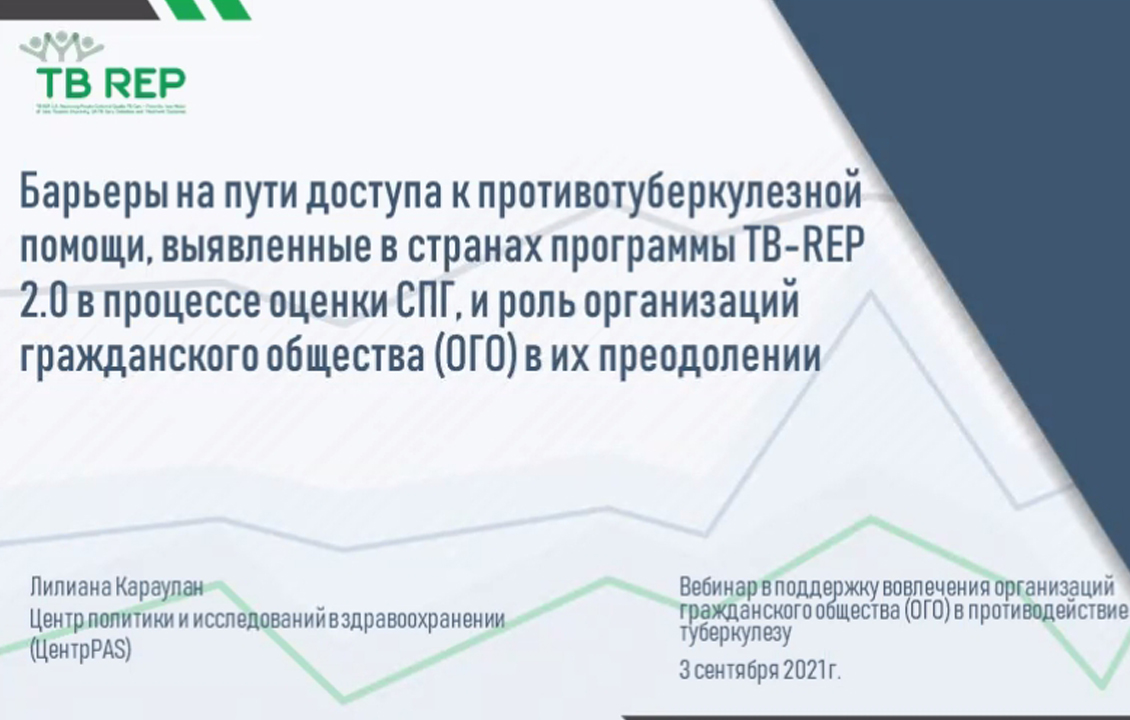
On September 3, the TB Europe Coalition online seminar on supporting the involvement of CSOs and communities in key areas of activity within the framework of the transition to the people-centered model of TB care in the EECA region was held.
The participants to the meeting discussed the priorities for strengthening the role of civil society in the transition to the people-centered model of care, within the framework of the four main areas of community/CSO activities. They also described what had already been successfully undertaken by civil society in EECA countries to remove barriers to accessing TB services and what are the main practical steps to enhance the meaningful participation of civil society and communities in a comprehensive response to combating infectious diseases.
Overcoming human rights, gender, stigma and discrimination barriers to TB service delivery is a priority that civil society organizations and communities should focus on. Unfortunately, because of such barriers, people avoid seeking services, which leads to the worsening of the TB situation.
A regional overview on communities, rights and gender has been developed by the Center for Health Policy and Studies (PAS Center). The identified barriers to access to TB care in TB-REP 2.0 countries in the LNG assessment process and what the role of civil society organizations (CSOs) should be in overcoming them was presented by Liliana Caraulan, Acting Director of the Center for Health Policy and Studies (PAS Center).
“Last December, we presented a regional overview“ Breaking the Silence: Barriers to Human Rights, Gender, Stigma and Discrimination in TB Services in the EECA Region ”, which summarized country research findings, identified common barriers and proposed potential solutions to remove these barriers. According to the study, the most common barriers are associated with: extreme degree of discrimination in relation to some key population groups; TB in women and gender-based violence; stigmatization by health workers; people-centered approach; the role of primary health care; job security and the right to work; actively identifying cases among the rural poor,” said Liliana Caraulan.
She also stressed that primary health care providers are playing an increasingly important role in the TB response, but the reports also mention the stigma coming from health care workers in virtually all countries: “Stigma towards key populations is often associated with breaches of confidentiality and discrimination by doctors. Each of the key groups requires separate interventions suitable to their context.”
People with TB also face challenges in exercising their right to work, namely, the person who has a job does not know if they will be able to continue working after TB treatment. “Legislation does not always protect the right to employment during treatment, as well as preservation of a job. This can lead to the fact that people interrupt treatment so that they can provide for their family, - emphasized Liliana Caraulan. “The report also shows that people in rural areas face increased barriers, in particular: delayed diagnosis due to remoteness, lack of money for travel and low awareness of TB.”
At the end of her speech, Ms. Liliana stressed that “we cannot remove structural barriers if we do not have proper constructive cooperation between all stakeholders, all partners involved in the TB response. Much has been done, we can talk about synergies between communities and civil society in achieving country and regional TB targets, but much remains to be done. We must also be actively involved in the development of the new Global Fund strategy beyond 2022 - this is a great opportunity to put structural barriers at the forefront of TB control and to prioritize evidence-based LNG interventions and community and civil society leadership in their elimination. I call on you to actively participate in all processes of developing the strategy of the Global Fund."
The online workshop was organized by the TB Europe Coalition in collaboration with the PAS Center and the WHO Regional Office for Europe.